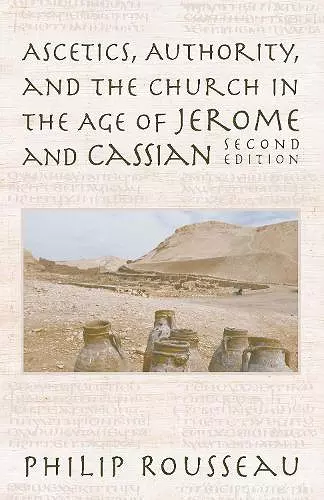Ascetics, Authority, and the Church in the Age of Jerome and Cassian
Format:Paperback
Publisher:University of Notre Dame Press
Published:31st May '10
Currently unavailable, and unfortunately no date known when it will be back

In his Ascetics, Authority, and the Church in the Age of Jerome and Cassian, first published in 1978, Philip Rousseau presents a survey of asceticism in the western church until about 400, including a selective study of Jerome, and then, moving into the fifth century, a reading of Sulpicius and Cassian. Rousseau explores such societal changes as the eventual triumph of the coenobitic movement and its growing effect within the church, not least on the episcopate. He focuses primarily on the development among ascetics of a certain concept of spiritual authority; on the attraction of that concept for a wider audience; and on its enduring formulation within a literary tradition of great influence. For this second edition, Rousseau has supplied a new introduction, with extensive bibliographical references, that charts the ways in which scholarship on early Christian asceticism has developed since his compelling and influential original argument.
For this second edition, Rousseau has supplied a new introduction with extensive bibliographical references in which he charts the ways in which scholarship on early Christian asceticism has developed since his compelling and influential original argument.
“Philip Rousseau’s Ascetics, Authority, and the Church in the Age of Jerome and Cassian is rightly considered one of the seminal studies of Christian asceticism . . . Rousseau is interested in the development of the concept of spiritual authority among desert ascetics, the appeal of this concept beyond the deserts, especially among bishops, and the actualization and articulation of this concept by Jerome, Martin of Tours, and John Cassian.” —Bryn Mawr Classical Review
“This second edition will be of interest to church historians and ecclesiologists. For those concerned with the development of the roles of the priesthood, episcopacy, and laity in Christian life, Rousseau’s work provides a careful, contextualized look at a crucial moment in history.” —Catholic Books Review
"A scholarly, well-documented and extremely interesting work. . . . [A] most valuable contribution towards understanding the ascetic movement in late antiquity." —Journal of Theological Studies
"[A]n exceptionally penetrating exploration of the deeper waters of monasticism: specifically, ideals of ascetic authority circulating in Egypt (the Desert Fathers) and Gaul (Martin, Sulpicius Severus, John Cassian) in the century after Constantine. . . . Ascetics, Authority, and the Church is preeminently a book about literature in its historical setting; a skillful demonstration of how the creation of a written tradition . . . was central to the process of bridging the gap between the charismatic power of the holy man and the settled monastic community, of preserving the essential tradition of spiritual authority through changing patterns of ascetic life." —Journal of Roman Studies
“. . . Rousseau captures an essential turning point in the history of western spirituality and shows how the influence of eastern ideas made the crucial difference.” —Classical World
“. . . this work . . . opens new vistas for the study of the ascetics. . . . This is a book that should not only be read; it should be experienced.” —Historian
ISBN: 9780268040291
Dimensions: 216mm x 140mm x 18mm
Weight: 408g
320 pages